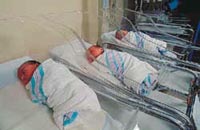Hearing Loss in Babies

Although most babies can hear normally, 1 to 3 out of every 1000 babies are born with some degree of hearing loss. However, without screening or testing, hearing loss may not be noticed until the baby is more than one year old. If hearing loss is not detected until later years, there will not be stimulation of the brain's hearing centers. This can affect the maturation and development of hearing, and can delay speech and language. Social and emotional development and success in school may also be affected. Many of the complications of hearing loss can be prevented with diagnosis and treatment before 6 months of age.
Most hearing loss is congenital (present at birth), but some babies develop hearing loss after they are born. Hearing loss is more likely in premature babies and babies with respiratory problems who have required long-term use of breathing machines, those with previous infections, and those taking certain medications.
Because of these risks, many health organizations, including the National Institutes of Health, the Joint Committee on Infant Hearing, the American Academy of Pediatrics, and the American Academy of Audiology, now recommend universal infant hearing screening. This means all newborn babies should be screened for hearing loss. Most often, the parents are the first to detect hearing loss in their child.
For more information go to www.riversidehealthcare.org/hearing-and-balance
© 2000-2025 The StayWell Company, LLC. All rights reserved. This information is not intended as a substitute for professional medical care. Always follow your healthcare professional's instructions.